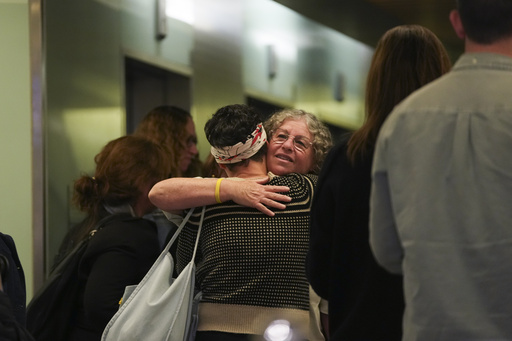Families of hostages released from Gaza over the weekend have shared accounts of the severe conditions endured during their captivity, including limited access to sunlight. This recent release highlights the ongoing ceasefire agreement, which outlines a six-week initial phase that includes the liberation of 33 hostages alongside nearly 2,000 prisoners. The deal also addresses the movement of Palestinians back to northern Gaza and aims to enhance humanitarian aid to the beleaguered region. As Israel and Hamas initiate talks for a subsequent phase of the ceasefire, the focus remains on negotiating the release of remaining hostages and potentially extending the truce indefinitely. Failure to reach an agreement could lead to the resumption of war as early as March.
According to the UN, over 545,000 Palestinians have reportedly moved to northern Gaza following the implementation of the ceasefire agreement. U.N. spokesman Stephane Dujarric announced on Monday that around 36,000 individuals were recorded relocating from north to south during the same timeframe. Temporary facilities capable of accommodating 5,000 people have been established in Beit Hanoun, Beit Lahiya, and Jabalya, as humanitarian aid begins to flow into Gaza. Dujarric noted that while there has been a slight decrease in prices, accessibility to basic needs like food still remains significantly lower than pre-conflict conditions due to a widespread cash shortage.
As part of ongoing efforts, U.N. humanitarian chief Tom Fletcher is in the region for a week to assess the situation in both the West Bank and Gaza. His mission includes meetings with senior officials to gain insight into the challenges faced by aid organizations and to explore ways to enhance humanitarian operations.
Recently released hostage Yarden Bibas described harsh conditions including emotional distress during his time in captivity. His sister disclosed that he suffered substantial weight loss and had limited exposure to natural light. Yarden was separated from his wife Shiri Bibas and their two children, Ariel and Kfir, who were taken during the initial Hamas attack on October 7, with Kfir being the youngest of the child hostages. Upon his release, Yarden has been preoccupied with the whereabouts of his family, as Shiri’s sister revealed his anguished inquiry about his missing loved ones.
In a separate incident, the Israeli military has reported destroying several arms storage sites in southern Lebanon, claiming to have found various military assets linked to Hezbollah. This operation coincided with the ongoing fragile ceasefire that has been in place for nearly three months. Israel alleges that its forces have been impeded by both Hezbollah and the Lebanese army in fulfilling their respective obligations to secure the area after a designated 60-day period for withdrawal expired at the end of January.
American-Israeli hostage Keith Siegel also provided details of his captivity, citing prolonged isolation and inadequate nourishment, which led to drastic weight loss. In a heartfelt encounter, he sought information regarding the tragic events that transpired during the October assault on Kibbutz Kfar Aza, where he lost many friends. His wife, Aviva Siegel, who was released alongside him, extended gratitude to U.S. President Donald Trump for facilitating the ceasefire talks and urged continued efforts for the next phase to ensure peace.
Amid the evolving situation, Israeli opposition leader Yair Lapid stated that the continuation of the ceasefire and the return of hostages would not destabilize Prime Minister Netanyahu’s government. His comments were made ahead of Netanyahu’s meeting with Trump, aiming to eliminate any notion that domestic political pressures would affect the resolution’s progress. Lapid emphasized that the ceasefire agreement has broad support among the public and within the Israeli parliament.
In another development, senior Russian diplomat Mikhail Bogdanov met with a Hamas envoy to discuss the ongoing ceasefire in Gaza, emphasizing the need for increased humanitarian support for the affected population. They reaffirmed the importance of fulfilling the commitments made by the Hamas leadership regarding hostages.
Looking to strengthen diplomatic relations, Syria’s interim president is scheduled to visit Turkey for discussions on the country’s path toward economic recovery and stability. This visit marks the second international trip for Ahmad al-Sharaa, a former rebel leader, as he seeks to fortify alliances with Turkey, a historical supporter of anti-government factions during the Syrian civil conflict.



